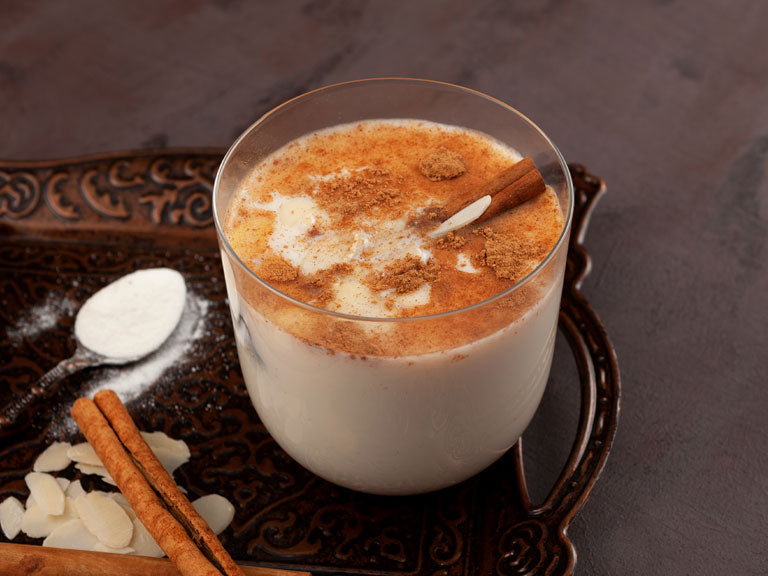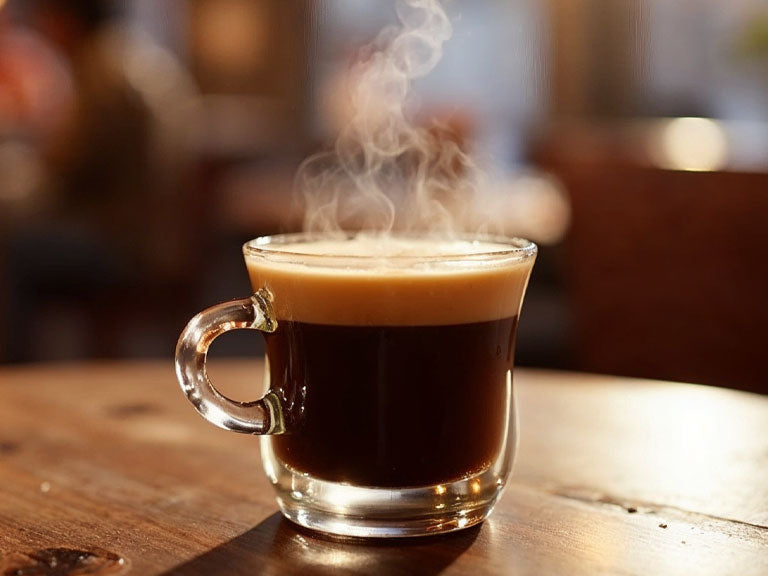

Cappuccino selber machen
Der Cappuccino ist der Klassiker unter den italienischen Kaffeespezialitäten und darf auch hierzulande auf keiner Kaffeekarte in Cafés, Coffeeshops oder Restaurants fehlen. Ein guter Cappuccino berührt jeden unserer Sinne und bringt das italienische Lebensgefühl für einen Moment ganz nah. Damit auch Du Dir einen perfekten Cappuccino zubereiten kannst, erklären wir Dir diese Zubereitungsart Schritt für Schritt mit hilfreichen Tipps.

Entscheidend für ein kraftvolles Kaffeearoma im Cappuccino ist die Auswahl der Kaffeebohnen. Eine stark geröstete Kaffeesorte ist meist die erste Wahl. Wir lieben im Cappuccino unsere Black Label Coffee Espressobohnen Natural Uganda. Eine Kaffeebohne aus 100% Robusta die super in Kaffeevariationen mit der Milch harmonisiert und durch ihren kräftigen und intensiven Geschmack überzeugt. So kommt das italienische Flair direkt in Deine Tasse und die Cappuccino Zubereitung gelingt bestimmt.
Bevorzugst Du eher einen milden Kaffeegeschmack solltest Du lieber zu 100% Arabicabohnen greifen, zum Beispiel unsere säurearmen Kaffeebohnen, die Malabar Arabica. Ist Dir der Kaffeegeschmack immer noch zu intensiv, ist vielleicht ein Milchkaffee eher etwas für Dich.
Um einen perfekten Cappuccino selber zu machen, ist eine Siebträgermaschine mit guter Dampfdüse oder ein elektrischer Milchaufschäumer notwendig. Wer aber auf die schönen Kunstwerke, in der Fachsprache “Latte Art” auf dem Cappuccino verzichten kann, bekommt auch daheim ohne teure Kaffeemaschinen einen wunderbaren Cappuccino hin. Denn es ist auch möglich, einen Cappuccino mit einem einfacheren Vollautomaten zuzubereiten. Wie das gelingt zeigen wir euch in diesem Artikel.
Cappuccino Zubereitung: Das Equipment
Für dein Cappuccino Rezept brauchst Du eine Möglichkeit zum Espresso machen und eine Möglichkeit zum Milch aufschäumen. Hast Du eine Siebträgermaschine oder einen Vollautomaten? Dann bist Du hier schon sehr gut ausgestattet, da Du beide Zubereitungsschritte an einer Maschine ausführen kannst. Zudem haben die Dampfdüsen dieser Maschinen einen sehr hohen Druck und bringen viel Luft in den Milchschaum um dessen cremige Konsistenz zu erreichen. Aber auch mit einem Espressokocher oder einer Aeropress kannst Du einen vorzeigbaren Cappuccino zaubern. Zur Herstellung des Milchschaums bieten sich dann mehrere alternative Möglichkeiten an: Elektrische Milchaufschäumer, ein Schneebesen oder ein fest verschließbares Schraubglas. Dazu aber später mehr.
Egal welches technische System Du nutzt, ein Edelstahlkännchen mit kleinem Ausguss erleichtert enorm die Arbeit. Besser sogar zwei. Warum erklären wir Dir bei der Zubereitung. Die Kännchen bekommst Du in unterschiedlichen Größen. Für ein bis zwei Cappuccini empfehlen wir die kleinen Milchkännchen mit 350ml Fassungsvermögen.
Richtige Schreibweise: Cappuccino Mehrzahl? = Cappuccini
Laut Duden ist die Mehrzahl von Cappuccino Cappuccini. Gleichfalls korrekt ist laut dem Wörterbuch die Schreibweise die Cappuccino[s] .
Zu guter Letzt brauchst Du natürlich kleine runde Tassen, am besten dickwandig, wie Du sie aus Cafés kennen wirst. Etwa 200 - 250 ml Flüssigkeit sollten reinpassen. Schau auch hier mal in unserem Shop vorbei. Dort haben wir eine Auswahl an tollen Cappuccinotassen. Die stylischen Cupping Bowls eignen sich dafür übrigens auch hervorragend.
Die Zutaten
100ml - 150ml kalte Milch
oder Milchersatzprodukte (Milchprodukte mit hohem Fett- und Eiweißgehalt lassen sich etwas einfacher schäumen und haben einen festeren Schaum)
ca. 25ml Espresso
(Typisch für diese italienische Kaffeespezialität ist eine kräftige Bohne. Wir empfehlen hier unseren Java Robusta. Wem das aber zu stark kann natürlich auch eine säurearme Bohne verwenden. Letztlich ist die Qualität entscheidend für ein intensives Geschmackserlebnis.
eventuell Sirup
Wer mag kann den Cappuccino natürlich auch mit einem Sirup nach Geschmack süßen. Hervorragend eignen sich hier Nuss- oder Schokovarianten.
Die Zubereitung
Ein klassischer Cappuccino besteht aus einem Espresso mit aufgegossener, geschäumter Milch und besticht durch eine schöne Haube aus Milchschaum. Wer es kräftiger mag nimmt einen doppelten Espresso und reduziert dadurch den Milchanteil.
Anders als bei einem Latte Macchiato beginnt man bei dieser Zubereitungsart mit dem Espresso und schäumt erst danach die Milch auf.

Schritt für Schritt zum perfekten Cappuccino
1. Schritt – Der Espresso
Du fragst dich ob du für deinen Cappuccino zuerst Milch oder Kaffee zubereitest? Nun ja, Espresso zuerst ist die Devise. Bevor jedoch der Espresso zubereitet wird, solltest Du die Tasse vorwärmen. Entweder hast Du die Tassen auf der Wärmefläche Deiner Maschine stehen oder du schwenkst die Tasse mit heißem Wasser aus. Das ist wichtig, damit der Espresso nicht kalt wird, während Du Dich um die Milch kümmerst. Bereite dann den Espresso zu und lasse ihn direkt in die Tasse laufen bzw. gieße ihn direkt in die Tasse. Bei Black Label Coffee kannst du auch gleich die passenden Kaffeebohnen kaufen.

Unser Tipp: Solltest Du mit einer Siebträgermaschine/Vollautomaten arbeiten, kannst Du auch während der Espresso in die Tasse läuft die Milch aufschäumen.
2. Schritt – Milchaufschäumen
Wer eine Siebträgermaschine oder einen Vollautomaten mit Dampfdüse besitzt, füllt das Milchkännchen bis zur Hälfte mit kalter Milch und führt die Dampflanze in die Milch. Achte darauf das die Dampfdüsen tief in der Milch stecken bevor Du den Dampf aufdrehst. Ansonsten gibt es eine riesen Sauerei in der Küche. Nach dem Aufdrehen des Dampfes bringst du die Dampflanze bis kurz unter die Milchoberfläche bis Du ein “schmatzendes” Geräusch wahrnimmst. Dann ziehe das Kännchen stückweise mit der Entwicklung des Schaumes langsam nach unten. Die Dampfdüsen befinden sich dabei immer kurz unter der Oberfläche der Milch und wirbeln Luft in die Milch und der Schaum entwickelt sich. Am Ende solltest Du mindestens ein Drittel mehr Inhalt im Milchkännchen haben als vorher.

Unser Tipp: Drehe den Dampf ab, wenn das Kännchen heiß wird und Du es gerade noch so halten kann. Das ist meist der perfekte Zeitpunkt für die richtige Milchtemperatur.
Keine Dampfdüse daheim? Alternative Wege zum Milchschaum.
Du kannst auch ohne teures Equipment guten Milchschaum zubereiten. Du benötigst aber in jedem Fall ein Kochtopf oder eine Mikrowelle. Außerdem entweder einen Schneebesen, ein Schraubglas oder einen elektrischen Milchaufschäumer. Bei den ersten beiden Methoden kommt noch etwas Muskelarbeit dazu. MIt dem Schneebesen musst Du die Milch im Topf kräftig und schnell schlagen. Bei der Schraubglasmethode wird die warme Milch bis zur Hälfte ins Glas gefüllt, mit dem Deckel verschlossen und kräftig geschüttelt.

Unser Tipp: Kalte und vor allem frische Milch lässt sich am Besten schäumen!
Wichtig: Bei der Milchschaumzubereitung ist die Temperatur der Milch entscheidend. Die Temperatur darf niemals höher als 70° sein. Dann verändern sich nämlich die Enzyme der Milch und es entsteht kein Schaum mehr und die Milch riecht und schmeckt verbrannt. Den perfekten Schaum bekommst Du bei Gradzahlen im Bereich von 50°- 65° Grad hin. Ein guter Richtwert ist, wenn Du mit den Fingern das Kännchen anfassen kannst und es kurz vor zu heiß ist, hast Du die perfekte Temperatur. Außerdem gut zu wissen: Bereits geschäumte Milch lässt sich so gut wie gar nicht mehr schäumen. Daher raten wir Dir lieber nochmal mit frischer, kalter Milch zu starten und die bereits verwendete Milch für etwas anderes weiter zu benutzen.
3. Schritt – Latte Art
Nun kommt der wohl spannendste Teil: Die Milch muss in den Espresso und das Ergebnis soll auch noch gut aussehen. Hast Du die Milch mithilfe einer Dampflanze geschäumt und einen cremigen, feinporigen Schaum hergestellt kannst Du es nun mit Latte Art versuchen. Jetzt kommt auch die zweite Edelstahlkanne ins Spiel. Wir gießen dazu vorsichtig aber zügig, mit starker Neigung der Kännchen die benötigte Milchmenge in das zweite Milchkännchen um. So vermengt sich die Milch mit dem cremigen Schaum nochmal ganz besonders.
Danach nimmst Du die Cappuccinotasse in die andere Hand und beginnst mit dem Eingießen der Milch. Dazu führe zunächst das Kännchen nah an die Tasse und gieße die Milch mittig in die Tasse. Nun kannst Du auch etwas links und rechts schwenken und am Ende das Kännchen nach oben ziehen und dabei einmal nach vorn oder hinten neigen. So entstehen mit etwas Übung Herzchen oder Blätter.

Alternative Methode zum Milch aufschäumen
Wenn Du eine alternative Methode zum Milch aufschäumen verwendet hast kannst Du mit einem Esslöffel arbeiten. Während Du die Milch mittig in die Tasse eingießt, hälst Du zunächst den Schaum mit dem Esslöffel zurück. Ist die Tasse zur Hälfte gefüllt, schiebst du mit dem Löffel großzügig den Schaum mit in die Tasse.


Unser Tipp: Wenn Du Deinen Cappuccino gerne süß trinkst, rühre doch mal den Zucker oder Sirup direkt in den Espresso bevor Du die Milch aufgießt. Der süße Geschmack verteilt sich so viel besser.
Cappuccino selber machen: Die Kurzanleitung
Benötigtes Equipment:
- Espressomaschine oder eine Alternative um einen Espresso herzustellen
- Tasse mit etwa 200ml Fassungsvermögen
- Edelstahlkännchen
- Kräftige Kaffeebohnen
- Frische Milch oder eine Milchalternative
- eventuell Zucker oder Sirup
Ablauf:
- Espresso zubereiten und in eine Tasse gießen
- Milch aufschäumen
- Milch direkt nach dem Aufschäumen vorsichtig aber zügig in die Tasse mittig auf den Espresso gießen. Bei festem Schaum mit einem Löffel den Schaum mitschieben.

MechthildErhard
Copywriter / Content Creator
Mechthild Erhard is a self-confessed coffee nerd and has been successfully running the bambule.Kaffeebar in Cologne since 2013. With the necessary caffeine in her blood, she is a content creator for our coffee magazine, writing specialist articles on the preparation and enjoyment of coffee beans. On top, of course, with the best tips for home baristas.




